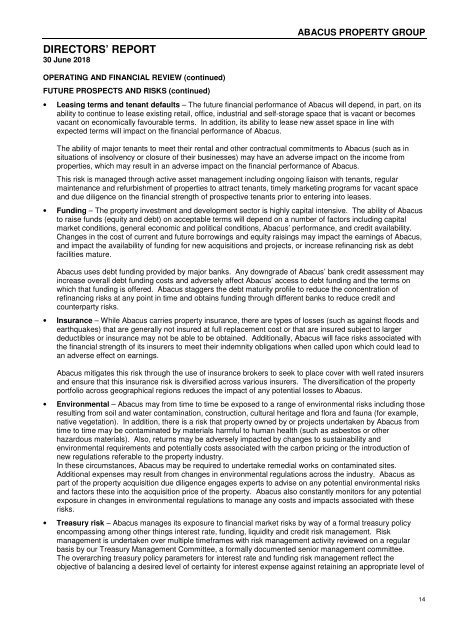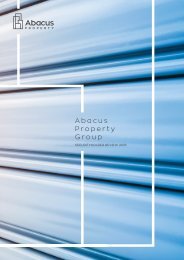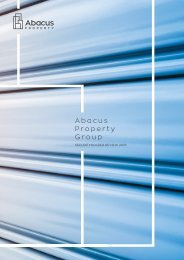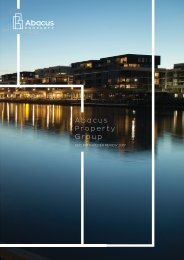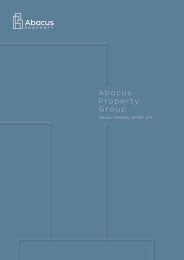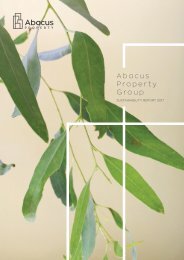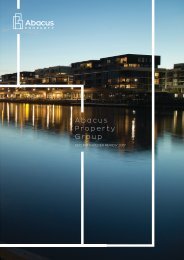Abacus Property Group – Annual Financial Report 2018
You also want an ePaper? Increase the reach of your titles
YUMPU automatically turns print PDFs into web optimized ePapers that Google loves.
DIRECTORS’ REPORT<br />
30 June <strong>2018</strong><br />
ABACUS PROPERTY GROUP<br />
OPERATING AND FINANCIAL REVIEW (continued)<br />
FUTURE PROSPECTS AND RISKS (continued)<br />
• Leasing terms and tenant defaults <strong>–</strong> The future financial performance of <strong>Abacus</strong> will depend, in part, on its<br />
ability to continue to lease existing retail, office, industrial and self-storage space that is vacant or becomes<br />
vacant on economically favourable terms. In addition, its ability to lease new asset space in line with<br />
expected terms will impact on the financial performance of <strong>Abacus</strong>.<br />
The ability of major tenants to meet their rental and other contractual commitments to <strong>Abacus</strong> (such as in<br />
situations of insolvency or closure of their businesses) may have an adverse impact on the income from<br />
properties, which may result in an adverse impact on the financial performance of <strong>Abacus</strong>.<br />
This risk is managed through active asset management including ongoing liaison with tenants, regular<br />
maintenance and refurbishment of properties to attract tenants, timely marketing programs for vacant space<br />
and due diligence on the financial strength of prospective tenants prior to entering into leases.<br />
• Funding <strong>–</strong> The property investment and development sector is highly capital intensive. The ability of <strong>Abacus</strong><br />
to raise funds (equity and debt) on acceptable terms will depend on a number of factors including capital<br />
market conditions, general economic and political conditions, <strong>Abacus</strong>’ performance, and credit availability.<br />
Changes in the cost of current and future borrowings and equity raisings may impact the earnings of <strong>Abacus</strong>,<br />
and impact the availability of funding for new acquisitions and projects, or increase refinancing risk as debt<br />
facilities mature.<br />
<strong>Abacus</strong> uses debt funding provided by major banks. Any downgrade of <strong>Abacus</strong>’ bank credit assessment may<br />
increase overall debt funding costs and adversely affect <strong>Abacus</strong>’ access to debt funding and the terms on<br />
which that funding is offered. <strong>Abacus</strong> staggers the debt maturity profile to reduce the concentration of<br />
refinancing risks at any point in time and obtains funding through different banks to reduce credit and<br />
counterparty risks.<br />
• Insurance <strong>–</strong> While <strong>Abacus</strong> carries property insurance, there are types of losses (such as against floods and<br />
earthquakes) that are generally not insured at full replacement cost or that are insured subject to larger<br />
deductibles or insurance may not be able to be obtained. Additionally, <strong>Abacus</strong> will face risks associated with<br />
the financial strength of its insurers to meet their indemnity obligations when called upon which could lead to<br />
an adverse effect on earnings.<br />
<strong>Abacus</strong> mitigates this risk through the use of insurance brokers to seek to place cover with well rated insurers<br />
and ensure that this insurance risk is diversified across various insurers. The diversification of the property<br />
portfolio across geographical regions reduces the impact of any potential losses to <strong>Abacus</strong>.<br />
• Environmental <strong>–</strong> <strong>Abacus</strong> may from time to time be exposed to a range of environmental risks including those<br />
resulting from soil and water contamination, construction, cultural heritage and flora and fauna (for example,<br />
native vegetation). In addition, there is a risk that property owned by or projects undertaken by <strong>Abacus</strong> from<br />
time to time may be contaminated by materials harmful to human health (such as asbestos or other<br />
hazardous materials). Also, returns may be adversely impacted by changes to sustainability and<br />
environmental requirements and potentially costs associated with the carbon pricing or the introduction of<br />
new regulations referable to the property industry.<br />
In these circumstances, <strong>Abacus</strong> may be required to undertake remedial works on contaminated sites.<br />
Additional expenses may result from changes in environmental regulations across the industry. <strong>Abacus</strong> as<br />
part of the property acquisition due diligence engages experts to advise on any potential environmental risks<br />
and factors these into the acquisition price of the property. <strong>Abacus</strong> also constantly monitors for any potential<br />
exposure in changes in environmental regulations to manage any costs and impacts associated with these<br />
risks.<br />
• Treasury risk <strong>–</strong> <strong>Abacus</strong> manages its exposure to financial market risks by way of a formal treasury policy<br />
encompassing among other things interest rate, funding, liquidity and credit risk management. Risk<br />
management is undertaken over multiple timeframes with risk management activity reviewed on a regular<br />
basis by our Treasury Management Committee, a formally documented senior management committee.<br />
The overarching treasury policy parameters for interest rate and funding risk management reflect the<br />
objective of balancing a desired level of certainty for interest expense against retaining an appropriate level of<br />
14


